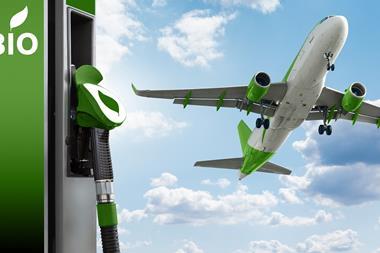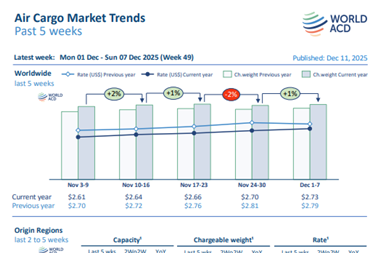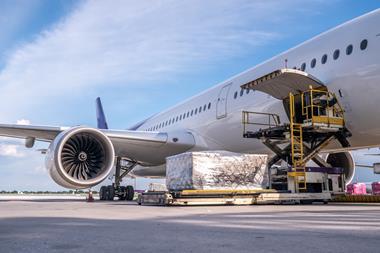Leading airfreight forwarders Kuehne+Nagel (K+N) and DSV both saw their airfreight volumes, revenues and profits decline in the second quarter of the year.
The world's leading air forwarder, K+N, saw its volumes decline 15.5% year on year to 482,000 tonnes, air net turnover fell 48% to Sfr1.6bn and earnings before interest and tax (ebit) slipped 65% to Sfr139m.
The company said the decline in volumes was in line with market performance and added that its cost reduction programmes had driven down cost per 100kg by 9% year on year in the second quarter.
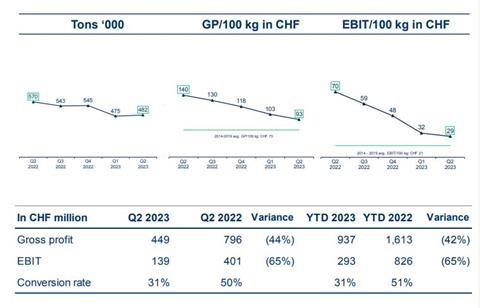
It also pointed out that it was in the process of purchasing perishable logistics specialist Morgan Cargo.
K+N chief executive Stefan Paul said: "Volumes in air logistics declined broadly in line with the market.
"While our ongoing cost control efforts became more visible in the second quarter of 2023, our strategic path is unchanged with a focus on high-quality logistics services and an extraordinary customer orientation."
The overall company reported a 43% decline in second-quarter revenues to Sfr6bn, ebit was down 51% to Sfr523m and earnings declined 50% to Sfr398m.
"Kuehne+Nagel coped well with the transition from the exceptional economic situation shaped by the pandemic," said Paul.
"In a weakened economic environment, sea and contract logistics gained market share and kept earnings stable."
At third-placed DSV, second-quarter airfreight volumes declined by 21.3% to 316,456 tonnes, air revenues slipped 51.4% to Dkr12.2bn and gross profit slipped 29.2% to Dkr3.6bn.
The company said its airfreight volume decline was worse than the overall market due to a focus on high-yielding verticals.
"During the first half of 2023, the global air and seafreight markets were characterised by a decline in demand, largely driven by the macroeconomic slowdown and the normalisation of consumer behaviour post the pandemic," said DSV.
"Furthermore, there is an ongoing reduction of inventory across several sectors."
The forwarder said that the weakest demand development was on export volumes from Asia Pacific, such as retail and consumer electronics.
Performance was also hit by the "normalisation of supply chains" with volumes shifting back from air to seafreight as bottlenecks in that sector cleared up.
"Owing to the combination of lower demand and more available belly-space in passenger planes, airfreight rates dropped further during second quarter 2023," the company added.
"Measured excluding fuel cost, the rates are now close to pre-pandemic levels on most trade lanes."
Besides the lower volumes, the decline in gross profit was due to lower gross profit yields compared to the record-high levels last year.
"In a competitive market, the division has maintained its focus on pricing discipline and high-margin business," DSV said.
"Furthermore, in line with the procurement strategy, the division has not taken long positions by entering long-term capacity commitments.
"Gross profit yields are expected to gradually decline in the coming quarters as the normalisation of freight markets continue and contracts are renewed."
The overall company saw second quarter revenues decline 37.8% year on year to Dkr37.7bn, ebit before special items was down 34.8% to Dkr4.7bn and profits slipped 33.4% to Dkr3.4bn.
DSV group chief executive Jens Bjørn Andersen said: "The demand for transport and logistics services is soft, and during the first half of 2023 we have demonstrated our ability to adapt to changing market conditions.
"The market development outlook is still uncertain, but we see signs of stabilisation and we anticipate gradual improvement in global trade volumes over the next quarters."
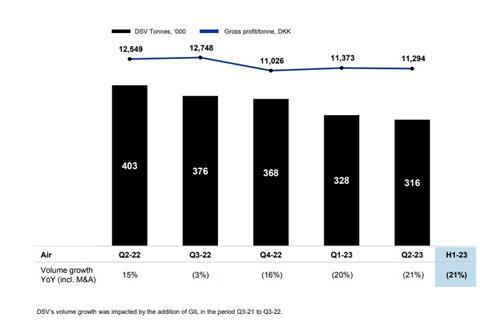
https://www.aircargonews.net/data/top-25-air-forwarders-kn-extends-its-lead-on-dhl/










